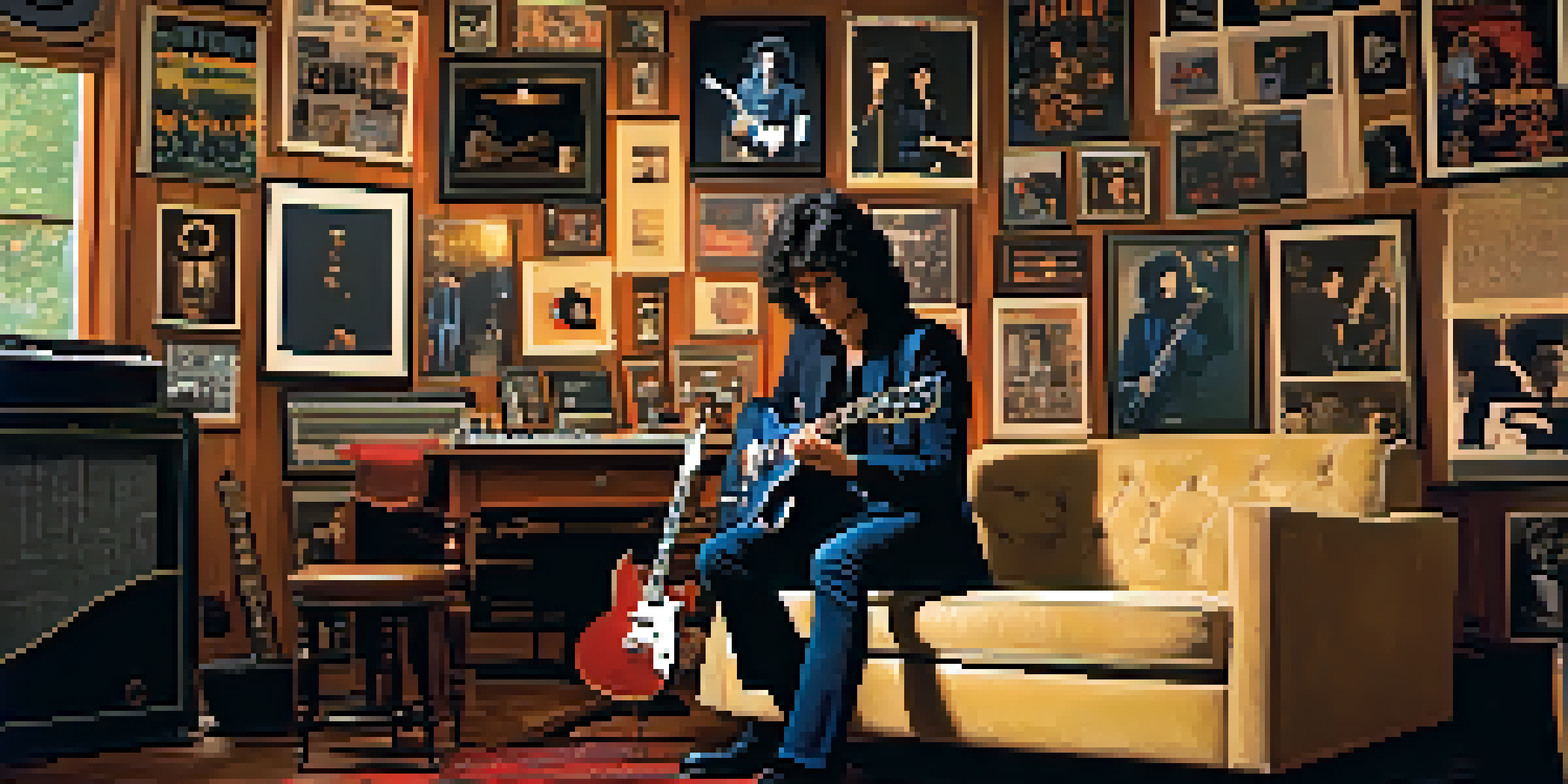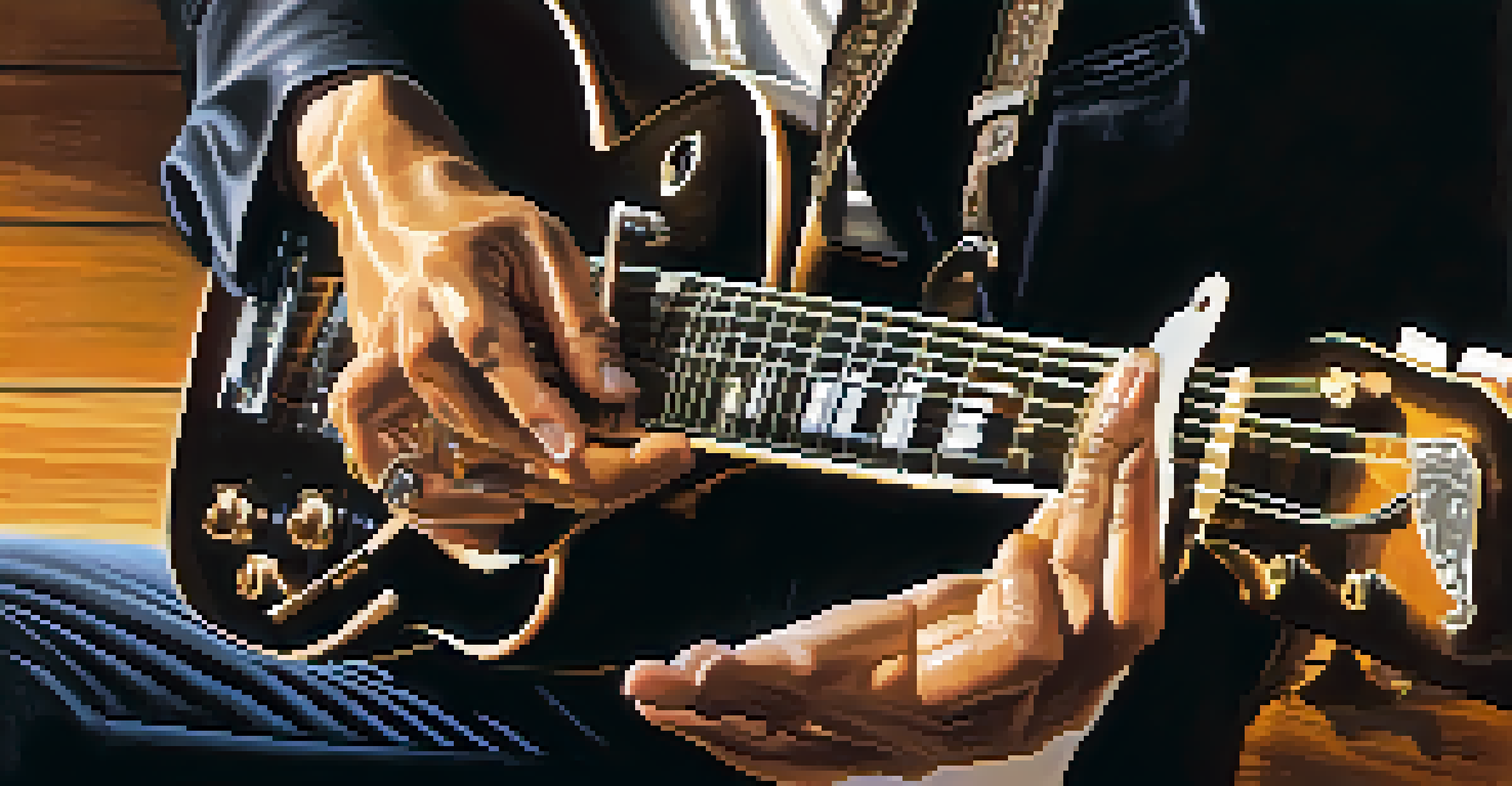Jimmy Page and His Role in Defining Hard Rock Guitar Sounds

The Early Years: Page's Musical Foundations
Jimmy Page's journey into music began in his childhood, where he was captivated by the sounds of rock and roll. Growing up in post-war England, he found inspiration in blues music, which would later play a crucial role in shaping his guitar style. His early exposure to artists like Muddy Waters and B.B. King helped him develop a deep understanding of musicality and expression.
There are no rules. You can do whatever you want. Just pick up the guitar and play.
By the time he was a teenager, Page was already a skilled session guitarist, working with various artists and bands. This experience honed his technical abilities and allowed him to experiment with different genres, from folk to rock. It was during these formative years that he began to develop his signature sound, blending blues riffs with innovative techniques.
These early influences laid the groundwork for his later work with Led Zeppelin. Page's ability to fuse various musical elements not only set him apart from his contemporaries but also defined the hard rock sound that would come to dominate the 1970s.
Joining Led Zeppelin: A New Era Begins
In 1968, Jimmy Page formed Led Zeppelin, bringing together talented musicians who would help him realize his musical vision. The chemistry between Page, Robert Plant, John Paul Jones, and John Bonham created a powerful dynamic that pushed the boundaries of rock music. With Page at the helm, the band quickly became known for their electrifying performances and groundbreaking studio work.

Page's innovative guitar techniques, such as the use of the violin bow on the guitar, showcased his creativity and willingness to experiment. This not only captivated audiences but also established new standards for guitarists everywhere. Songs like 'Whole Lotta Love' and 'Dazed and Confused' featured complex riffs and solos that became hallmarks of hard rock.
Page's Musical Foundations in Youth
Jimmy Page's early exposure to blues and rock music laid the groundwork for his innovative guitar style.
Led Zeppelin's success also allowed Page to explore various soundscapes, incorporating elements of folk, blues, and even Eastern music. This versatility contributed to the band's unique identity, further solidifying Page's role as a pioneer in the hard rock genre.
Innovative Techniques: Page's Signature Sounds
One of Jimmy Page's most significant contributions to hard rock guitar is his mastery of innovative playing techniques. His use of distortion, delay, and reverb helped create a rich, textured sound that became synonymous with Led Zeppelin. Page often experimented with different amp settings and effects, pushing the limits of what electric guitars could achieve.
The only thing that matters is how you play it.
Another notable technique was his fingerpicking style, which added a unique touch to his playing. Unlike many of his contemporaries who relied heavily on a pick, Page often used his fingers to pluck the strings, allowing for greater expressiveness and nuance in his solos. This approach not only showcased his technical prowess but also set a new standard for guitarists in rock music.
Moreover, Page's incorporation of slide guitar into his solos brought a bluesy, soulful quality to many of Led Zeppelin's songs. Tracks like 'Since I've Been Loving You' highlight how Page's techniques could evoke powerful emotions, demonstrating that hard rock could be both aggressive and deeply expressive.
The Studio Wizard: Page's Production Mastery
Beyond his role as a guitarist, Jimmy Page was also a skilled producer, playing a pivotal role in shaping Led Zeppelin's sound in the studio. His keen ear for detail and innovative recording techniques helped capture the band's raw energy and spontaneity. Page often employed unconventional methods, such as recording in unique locations to achieve distinctive sounds.
For example, during the recording of 'Stairway to Heaven,' Page utilized a variety of instruments and layered them to create a rich, immersive experience. This meticulous approach to production allowed the band to explore new sonic territories, further defining the hard rock genre. Page’s ability to blend acoustic and electric elements showcased his versatility and vision as a musician.
Led Zeppelin's Impact on Rock Music
As the driving force behind Led Zeppelin, Page's creativity and unique sound defined the hard rock genre in the 1970s.
His production work has inspired countless artists and producers, emphasizing the importance of creativity and experimentation in the studio. Page's influence can still be felt today, as many guitarists and producers strive to replicate the unique sounds he crafted during Led Zeppelin's heyday.
Live Performances: A Hard Rock Icon
Jimmy Page's live performances are legendary, known for their intensity and showmanship. Whether wielding his double-neck guitar or using a bow to create haunting melodies, Page captivated audiences around the world. His stage presence, coupled with his technical skill, made every performance a memorable experience.
The improvisational nature of Led Zeppelin's live shows allowed Page to showcase his guitar prowess, often extending solos and incorporating new elements into familiar songs. This spontaneity kept fans on their toes and contributed to the band's reputation as one of the greatest live acts in rock history. Each performance felt unique, as Page pushed the boundaries of his instrument in real-time.
Moreover, his influence on the live concert experience has inspired generations of musicians. Many guitarists today still aspire to capture the energy and creativity that Page brought to the stage, solidifying his status as a hard rock icon.
Cultural Impact: Page's Legacy in Music
Jimmy Page's influence on hard rock extends far beyond his time with Led Zeppelin. His innovative guitar work has inspired countless musicians across various genres, from rock to metal and beyond. Many guitarists credit Page as a primary influence in their own playing, showcasing the lasting impact of his style and techniques.
The music industry has seen a resurgence of interest in classic rock, with Page's work serving as a blueprint for many modern artists. Bands such as Foo Fighters and Greta Van Fleet have drawn inspiration from Led Zeppelin's sound, proving that Page's legacy is alive and well in contemporary music. This connection to the past reminds us of the enduring power of great music.
Enduring Legacy and Cultural Influence
Jimmy Page's innovative techniques and production mastery continue to inspire musicians across various genres today.
Furthermore, Page's commitment to pushing musical boundaries has led to increased experimentation within the genre. As new artists emerge, they often look to Page's work for inspiration, ensuring that his influence will continue to shape the future of hard rock for years to come.
Conclusion: Page's Enduring Influence on Hard Rock
In conclusion, Jimmy Page's role in defining hard rock guitar sounds cannot be overstated. His innovative techniques, production mastery, and unforgettable performances have left an indelible mark on the music world. Page's ability to blend various musical influences created a unique sound that resonated with fans and inspired a generation of musicians.
As we look back on his contributions, it's clear that Page's legacy will continue to influence aspiring guitarists and musicians for decades. His work with Led Zeppelin set a high bar for creativity and technical skill, making it a benchmark for future generations. The hard rock genre, as we know it today, owes much to Page's pioneering spirit and relentless pursuit of musical excellence.

Ultimately, Jimmy Page will always be remembered as a true innovator and a driving force behind the hard rock movement. His music continues to inspire, and his legacy will forever remain a cornerstone of rock history.